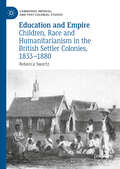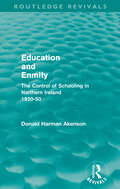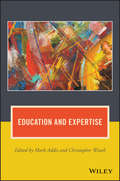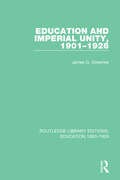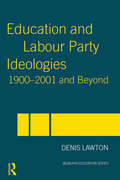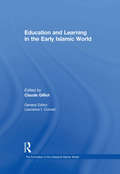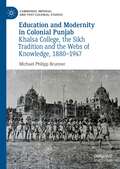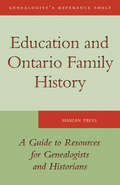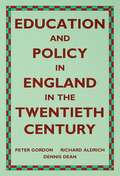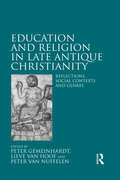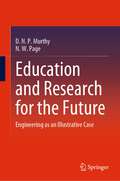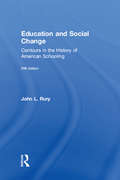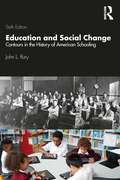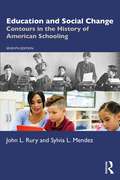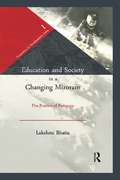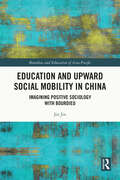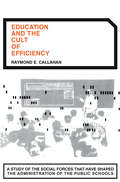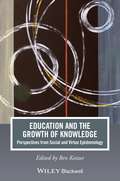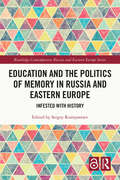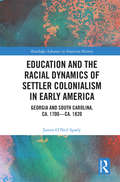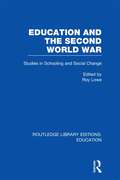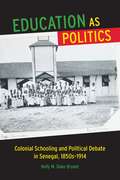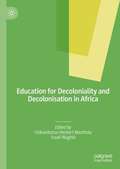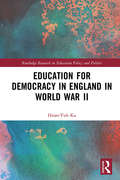- Table View
- List View
Education and Empire: Children, Race, and Humanitarianism in the British Settler Colonies, 1833-1880 (Cambridge Imperial and Post-Colonial Studies Ser.)
by Rebecca SwartzThis book tracks the changes in government involvement in Indigneous children’s education over the nineteenth century, drawing on case studies from the Caribbean, Australia and South Africa. Schools were pivotal in the production and reproduction of racial difference in the colonies of settlement. Between 1833 and 1880, there were remarkable changes in thinking about education in Britain and the Empire with it increasingly seen as a government responsibility. At the same time, children’s needs came to be seen as different to those of their parents, and childhood was approached as a time to make interventions into Indigenous people’s lives. This period also saw shifts in thinking about race. Members of the public, researchers, missionaries and governments discussed the function of education, considering whether it could be used to further humanitarian or settler colonial aims. Underlying these questions were anxieties regarding the status of Indigenous people in newly colonised territories: the successful education of their children could show their potential for equality.
Education and Enmity: The Control of Schooling in Northern Ireland 1920-50 (Routledge Revivals)
by Donald AkensonFirst published in 1973 Professor Akenson’s book traces the series of religious and political controversies which have battered the state schools of Northern Ireland. After the government’s admirably intentioned, but muddled, attempt to create a non-sectarian school system in the early 1920s, the educational system was progressively manipulated by sectarianism. The way in which the author describes how children are schooled reveals a great deal about the attitudes and values of the parental generation and also helps to explain the actions of later generations.
Education and Expertise (Journal of Philosophy of Education)
by Christopher Winch Mark AddisThe relevance of expertise to professional education and practice is explored in this collection of original contributions from educationalists, philosophers and psychologists. <p><p> Discusses the increasingly prominent debates about the nature of know-how in mainstream analytical epistemology <p> Illuminates what is involved in professional expertise and the implications of a sound understanding of professional expertise for professional education practice, curriculum design and assessment <p> All contributions are philosophically grounded and reflect interdisciplinary advances in understanding expertise
Education and Imperial Unity, 1901-1926 (Routledge Library Editions: Education 1800-1926 #6)
by James G. GreenleeUnder the influence of mounting foreign competition in the late-Victorian and Edwardian periods, many Britons sought to bolster England’s world position by reinforcing the unity of the Empire. For the most part their effort were channelled into an attempt to construct a formal political union or federation of Britain’s overseas dominions. However, when the so-called Imperial Federation Movement failed to produce a viable constitutional solution the problem of unity a number of people began to search for an alternative, non-political approach. In this connection a campaign was mounted during the first two decades of the twentieth century that came to emphasise the informal, spiritual ties which supposedly bound the Empire together. This title, first published in 1987, brings to light the assumptions, aspirations and schemes of those predominantly middle-class figures who orchestrated the Imperial Studies Movement at the turn of the twentieth-century. This title will be of interest to students of history and education.
Education and Labour Party Ideologies 1900-2001and Beyond (Woburn Education Series)
by Denis LawtonIn 1997 Tony Blair broke with tradition by naming education as a major priority for the General Election Manifesto. In the past, Labour leaders had tended to give education a much lower priority. Despite this, Blair has been greatly criticised for his educational programme 1997-2001. Was he taking education away from traditional labour values of fairness and equality? Was Blair's 'Third Way' just 'Thatcherism in Trousers'?Denise Lawton approaches such questions by analysing labour education policies since 1900 and shows that from the very beginning the labour Party lacked unity and ideological coherence concerning education. Specifically, there has always been a tension between those like the early Fabians who saw educational reform in terms of economic efficiency, and the ethical socialists whose vision of a more moral society stressed the importance of social justice in education. After an assessment of Labour ideologies in the past, this book concludes with an examination of New Labour and the 'Third Way' in education and suggests some changes that will be necessary in the near future.
Education and Learning in the Early Islamic World (The Formation of the Classical Islamic World #43)
by Claude GilliotStudying education and learning in the formative period of Islam is not immediately easy, since the sources for this are relatively late and frequently project backwards to the earlier period the assumptions and conditions of their own day. The studies in this volume have been selected for the critical approaches and methods of their authors, and are arranged under five headings: the pedagogical tradition; scholarship and attestation; orality and literacy; authorship and transmission; and libraries. Together with the editor’s introductory essay, they present a broad picture of the beginnings and evolution of education and learning in the Islamic world.
Education and Modernity in Colonial Punjab: Khalsa College, the Sikh Tradition and the Webs of Knowledge, 1880-1947 (Cambridge Imperial and Post-Colonial Studies)
by Michael Philipp BrunnerThis book explores the localisation of modernity in late colonial India. As a case study, it focuses on the hitherto untold colonial history of Khalsa College, Amritsar, a pioneering and highly influential educational institution founded in the British Indian province of Punjab in 1892 by the religious minority community of the Sikhs. Addressing topics such as politics, religion, rural development, militarism or physical education, the study shows how Sikh educationalists and activists made use of and ‘localised’ communal, imperial, national and transnational discourses and knowledge. Their modernist visions and schemes transcended both imperialist and mainstream nationalist frameworks and networks. In its quest to educate the modern Sikh – scientific, practical, disciplined and physically fit – the college navigated between very local and global claims, opportunities and contingencies, mirroring modernity’s ambivalent simultaneity of universalism and particularism.
Education and Ontario Family History: A Guide to the Resources for Genealogists and Historians
by Marian PressMany family researchers with Ontario roots discover they have ancestors who were teachers. Those with no teachers in the family may have ancestors who were part of the Ontario education system as students. Today there are numerous varied resources available to find information on teachers, pupils, schools, textbooks, and curricula in historical Ontario. Education and Ontario Family History outlines the resources available for education from about 1785 to the early twentieth century, not only for genealogists, but also for other historians with an interest in educational records. Many historical resources are currently being digitized, and Ontario and education are no exceptions. These electronic repositories are examined in author Marian Press’s book along with traditional paper and archival sources.
Education and Policy in England in the Twentieth Century
by Richard Aldrich Peter Gordon Dennis DeanIn the 1990s education has become one of the major social and political questions of the day. This book has been written to provide an authoritative guide to the issues which underlie the formulation of educational policy. It stands both as a substantial historical study in its own right and as an essential background and introduction to the current educational debate.
Education and Religion in Late Antique Christianity: Reflections, social contexts and genres (Studies In Education And Religion In Ancient And Pre-modern History In The Mediterranean And Its Environs Ser. #3)
by Peter Van Nuffelen Lieve Van Hoof Peter GemeinhardtThis book studies the complex attitude of late ancient Christians towards classical education. In recent years, the different theoretical positions that can be found among the Church Fathers have received particular attention: their statements ranged from enthusiastic assimilation to outright rejection, the latter sometimes masking implicit adoption. Shifting attention away from such explicit statements, this volume focuses on a series of lesser-known texts in order to study the impact of specific literary and social contexts on late ancient educational views and practices. By moving attention from statements to strategies this volume wishes to enrich our understanding of the creative engagement with classical ideals of education. The multi-faceted approach adopted here illuminates the close connection between specific educational purposes on the one hand, and the possibilities and limitations offered by specific genres and contexts on the other. Instead of seeing attitudes towards education in late antique texts as applications of theoretical positions, it reads them as complex negotiations between authorial intent, the limitations of genre, and the context of performance.
Education and Research for the Future: Engineering as an Illustrative Case
by D. N. Murthy N. W. PageThis book takes a fresh look at the fundamental character of education, its history, interaction with society, purpose, changing focus over time and interactions with technology. It surveys the role of research in increasing the body of knowledge leading to new technologies that have helped serve the needs of humankind.In our lifetime there have been profound changes to the world we live in; the technologies used, the problems we struggle with, and the education systems intended to prepare this and following generations for the future. Many of the problems we face now are more complex than in earlier times, requiring broadly based approaches our traditional silo specialisations are ill-prepared to deal with. They involve technologies whose range of positive and negative effects are not well understood. Many of these problems are global in nature and can no longer be treated just as local issues. Our current approach to education does not adequately prepare us to tackle these problems.New approaches to education are needed to prepare us for the changes that are to come. The future of our planet, our civilisation, our community and our economy depend on it. This book proposes changes that will better prepare us for this future.
Education and Social Change
by John L. RuryThis brief, interpretive history of American schooling focuses on the evolving relationship between education and social change. Like its predecessors, this new edition investigates the impact of social forces such as industrialization, urbanization, immigration and cultural conflict on the development of schools and other educational institutions. It also examines the various ways that schools have contributed to social change, particularly in enhancing the status and accomplishments of certain social groups and not others. Detailed accounts of the experiences of women and minority groups in American history consider how their lives have been affected by education. Changes in this new edition include the following: A more thorough treatment of key concepts such as globalization, human capital, social capital, and cultural capital. Enhanced attention to issues of diversity throughout. Greater thematic coherence as a result of dividing chapter 6 into two chapters, the first focusing on the postwar period and emphasizing the themes of equity and social justice and the second focusing on human capital in education, highlighting the standards movement, federal policy changes and neo-liberal reform. A revision of several focal point discussions for greater clarity and thematic releance. Update discussions of recent changes in educational politics, finance and policy, especially the troubles presently facing No Child Left Behind (NCLB).
Education and Social Change: Contours in the History of American Schooling
by John L. RuryThis brief, interpretive history of American schooling focuses on the evolving relationship between education and social change. Like its predecessors, this new edition investigates the impact of social forces such as industrialization, urbanization, immigration, and cultural conflict on the development of schools and other educational institutions. It also examines the various ways that schools have contributed to social change, particularly in enhancing the status and accomplishments of certain social groups and not others. Detailed accounts of the experiences of women and minority groups in American history consider how their lives have been affected by education at key points in the past. Updates to this edition A revised final chapter updated to include recent changes in educational politics, finance, policy, and a shifting federal policy context Enhanced coverage and new conceptual frames for understanding the experiences of women and people of color in the midst of social change Edited throughout to update information and sources regarding the history of American education and related processes of social transformation in the nation’s past
Education and Social Change: Contours in the History of American Schooling
by John L. Rury Sylvia L. MendezThis concise, interpretive history of American schooling focuses on the evolving relationship between education and social change.Like its predecessors, this fully updated new edition investigates the impact of social forces such as industrialization, urbanization, immigration, globalization, and cultural conflict on the development of schools and other educational institutions. It also examines the various ways that schools have contributed to social change, particularly in enhancing the status and accomplishments of certain social groups and not others. Detailed accounts of the experiences of women and minority groups in American history consider how their lives have been affected by education at key points in the past.Updates to the seventh edition include: Enhanced coverage for understanding the experiences of Native Americans, students in poverty settings, and the LGBTQ+ community in the midst of social change. New topics include settler colonialism, indigeneity, culturally diverse education, gay and transgender educational policies, charter schools, voucher programs, and the rise of testing in schools. It has been edited throughout to update information and sources regarding the history of American education and related processes of social transformation in the nation’s past.This bestselling introductory text is essential reading for Educational Foundations, History of Education, and Schools and Society, and similar courses for pre-service teachers, educational leaders, and others.New online material includes discussion questions and links to further reading and resources, available at www.routledge.com/9781032745947
Education and Society in a Changing Mizoram: The Practice of Pedagogy (Transition in Northeastern India)
by Lakshmi BhatiaLocated in the domain of cultural politics, the book with rich ethnographical data from Mizoram, a lesser known and understood state, brings the community, state and culture to centre-stage, along with family and stratification of the sociological discourse in education. The book argues for a re-look at school education in Mizoram, besides providing critical insights into the North East region as a whole. It also points to the dilemmas of development in that region and suggests possible ways out of the impasse. Marking a significant departure from conventional thinking on education as 'human capital' as reflected in North-East Vision: 2020, the book strongly advocates the need for critical pedagogies based on learning from conflict; inculcating the values of tolerance and compassion as a precursor to peace; reconceptualising `development, not merely as 'economic' but as indicator of national happiness and valuing lives equally besides respect for traditional institutions, thus marking a break from the much resented paternalism that underpins all state interventions in education. One of the first studies of its kind regarding experience and practice of education, the book makes an important contribution to the role that education can play to usher in peace and promote respect for differences.
Education and Upward Social Mobility in China: Imagining Positive Sociology with Bourdieu (Bourdieu and Education of Asia Pacific)
by Jin JinBased on a three-year life story study of students from working-class backgrounds at four elite universities in China, this book offers a new way to understand and be inspired by Bourdieu.This book shows how Bourdieu’s ideas can be used to go beyond the analysis of domination and imagine a positive sociology of emancipation. Drawing on life stories of high-achieving students from working-class backgrounds, who experienced extreme social mobility in the education system and beyond, this book tracks multi-scalar and multi-layered class domination while documenting vivid experiences of living with and over structural disadvantages, forms of working-class ‘intelligence’, reflexive strategies, ‘failures’ of social reproduction, and moments of ‘mutations’. Through constant comparisons between life stories and Bourdieu, hopes and costs of upward social mobility, and possibilities and boundaries of transcendence, this book reflects on different conceptualisations of working-class reflexivity and suggests a vision of emancipation that can allow and encourage ways and values of ‘commoning’. This book highlights a relational perspective of understanding class and class struggles, which in turn introduces a relational perspective of (re)imagining reflexivity and transcendence.This book will appeal to students and scholars of Bourdieu, sociology of education, and education in China.
Education and the Commercial Mindset
by Samuel E. AbramsThe movement to privatize K-12 education is stronger than ever. Samuel Abrams examines the rise of market forces in public education and reveals how a commercial mindset that sidesteps fundamental challenges has taken over. Nevertheless, public schools should adopt lessons from the business world, such as raising teacher salaries to attract talent.
Education and the Cult of Efficiency: A Study of the Social Forces That Have Shaped the Adminstration of the Public Schools
by Raymond E. CallahanRaymond Callahan's lively study exposes the alarming lengths to which school administrators went, particularly in the period from 1910 to 1930, in sacrificing educational goals to the demands of business procedures. He suggests that even today the question still asked is: "How can we operate our schools?" Society has not yet learned to ask: "How can we provide an excellent education for our children?"
Education and the Growth of Knowledge: Perspectives from Social and Virtue Epistemology (Journal of Philosophy of Education)
by Ben KotzeeEducation and the Growth of Knowledge is a collection of original contributions from a group of eminent philosophers and philosophers of education, who sketch the implications of advances in contemporary epistemology for education. New papers on education and social and virtue epistemology contributed by a range of eminent philosophers and philosophers of education Reconceives epistemology in the light of notions from social and virtue epistemology Demonstrates that a reconsideration of epistemology in the light of ideas from social and virtue epistemology will in turn re-invigorate the links between epistemology and education
Education and the Politics of Memory in Russia and Eastern Europe: Infested with History (Routledge Contemporary Russia and Eastern Europe Series)
by Sergey RumyantsevThis book examines both formal and extracurricular education, and the politics of memory and historical narratives in Armenia, Azerbaijan, Russia, and Ukraine. The misalignment between memory politics and history politics forms a central theme of this book. Structured in three parts, it focuses on school education in the post-Soviet states over the 30 years between the collapse of the Soviet Union and the 2022 Russian invasion of Ukraine. The chapters inquire as to how post-Soviet school education, politics of memory, and history politics became active participants in the production of state-approved ideology, patriotism, and a state-prescribed understanding of the national past. Armed conflicts in the territory of the former USSR not only saw numerous victims and refugees but also the emergence of new borders and unrecognized (de-facto) states, and the annexation of territories. They also contributed to the creation of new sites of memory, generated their own traditions of commemoration for the heroes and victims of these confrontations, and led to the reconstruction of historical narratives and the construction of new national myths. The research in this book foregrounds how the nationalization of the public space and the reconstruction of national historical narratives in the independent states reflect a desire to monopolize the power to interpret the past, with low tolerance of alternative accounts. In this light, the book covers issues such as the nation-state, Sovietization, national history creation, memory politics, religion, mass media, nationalism and patriotism, and analyzes the relationship of Azerbaijani and Armenian, Russian and Ukrainian societies with their histories and pasts. A novel study on the topic of memory and history writing, this is a timely contribution to the field of Post-Soviet history and Russian and Eastern European Studies.The Open Access version of this book, available at http://www.taylorfrancis.com, has been made available under a Creative Commons Attribution-Non Commercial-No Derivatives (CC-BY-NC-ND) 4.0 license.
Education and the Racial Dynamics of Settler Colonialism in Early America: Georgia and South Carolina, ca. 1700–ca. 1820 (Routledge Advances in American History #16)
by James O’Neil SpadyThis is the first historical monograph to demonstrate settler colonialism’s significance for Early America. Based on a nuanced reading of the archive and using a comparative approach, the book treats settler colonialism as a process rather than a coherent ideology. Spady shows that learning was a central site of colonial struggle in the South, in which Native Americans, Africans, and European settlers acquired and exploited each other’s knowledge and practices. Learned skills, attitudes, and ideas shaped the economy and culture of the region and produced challenges to colonial authority. Factions of enslaved people and of Native American communities devised new survival and resistance strategies. Their successful learning challenged settler projects and desires, and white settlers gradually responded. Three developments arose as a pattern of racialization: settlers tried to prohibit literacy for the enslaved, remove indigenous communities, and initiate some of North America's earliest schools for poorer whites. Fully instituted by the end of the 1820s, settler colonization’s racialization of learning in the South endured beyond the Civil War and Reconstruction.
Education and the Second World War: Studies in Schooling and Social Change (Routledge Library Editions: Education)
by Roy LoweThis was the first book which globally surveyed the impact of the Second World War on schooling. It offers fascinating comparisons of the impact of total war, both in terms of physical disruption and its effects on the ideology of schooling. By analysing the effects on the education systems of each of the participant nations the contributors throw new light on the responses made in different parts of the globe to the challenge of world-wide conflict.
Education as Politics
by Kelly M. Duke BryantIn 1914, Blaise Diagne was elected as Senegal's first black African representative to the National Assembly in France. Education as Politics reinterprets the origins and significance of this momentous election, showing how colonial schools had helped reshape African power and politics during the preceding decades and how they prepared the way for Diagne's victory. Kelly M. Duke Bryant demonstrates the critical impact of colonial schooling on Senegalese politics by examining the response to it by Africans from a variety of backgrounds and statuses--including rural chiefs, Islamic teachers, and educated young urbanites. For those Africans who chose to engage with them, the French schools in Senegal provided a new source of patronage, a potentially beneficial connection to the bureaucratizing colonial state, a basis for claims to authority or power, or an arena in which to debate pressing issues like the future of Qur'anic schooling and the increasing racism of urban society under colonial rule. Based on evidence from archives in Senegal and France, and on interviews Duke Bryant conducted in Senegal, she demonstrates that colonial schooling remade African politics during this period of transition to French rule, creating political spaces that were at once African and colonial, and ultimately allowing Diagne to claim election victory.
Education for Decoloniality and Decolonisation in Africa
by Yusef Waghid Chikumbutso Herbert ManthaluThis book focuses on understandings of higher education in relation to notions of decoloniality and decolonization in southern Africa. The volume draws on a range of case studies in multiple politico-cultural contexts on the African continent, and examines some of the challenges to be overcome in order to achieve education for decolonization and decoloniality. Acknowledging that patterns of exclusion, inequality and injustice are still prevalent in the African higher education landscape, the editors and contributors proffer bold attempts at democratizing education and examine how to cultivate just, equal and diverse pedagogical relations. Featuring case studies from South Africa, Zambia, Malawi, and Zimbabwe, the authors and editors examine how higher education can be further democratized and transformed along the lines of equality, liberty and recognition of diversity. This hopeful and bold collection will be of interest to scholars of decoloniality and decolonization in higher education, as well as higher education in southern Africa more specifically.
Education for Democracy in England in World War II (Routledge Research in Education Policy and Politics)
by Hsiao-Yuh KuEducation for Democracy in England in World War II examines the educational discourse and involvement in wartime educational reforms of five important figures: Fred Clarke, R. H. Tawney, Shena Simon, H. C. Dent and Ernest Simon. These figures campaigned for educational reforms through their books, publishing articles in newspapers, delivering speeches at schools and conferences and by organizing pressure groups. Going beyond the literature in this key period, the book focuses on exploring the relationship between democratic ideals and reform proposals in each figure’s arguments. Displaying a variety of democratic forums for debates about education beyond parliament, the book re-interprets wartime educational reforms from a different perspective and illustrates the agreements and contradictions in the educational discourse itself.
